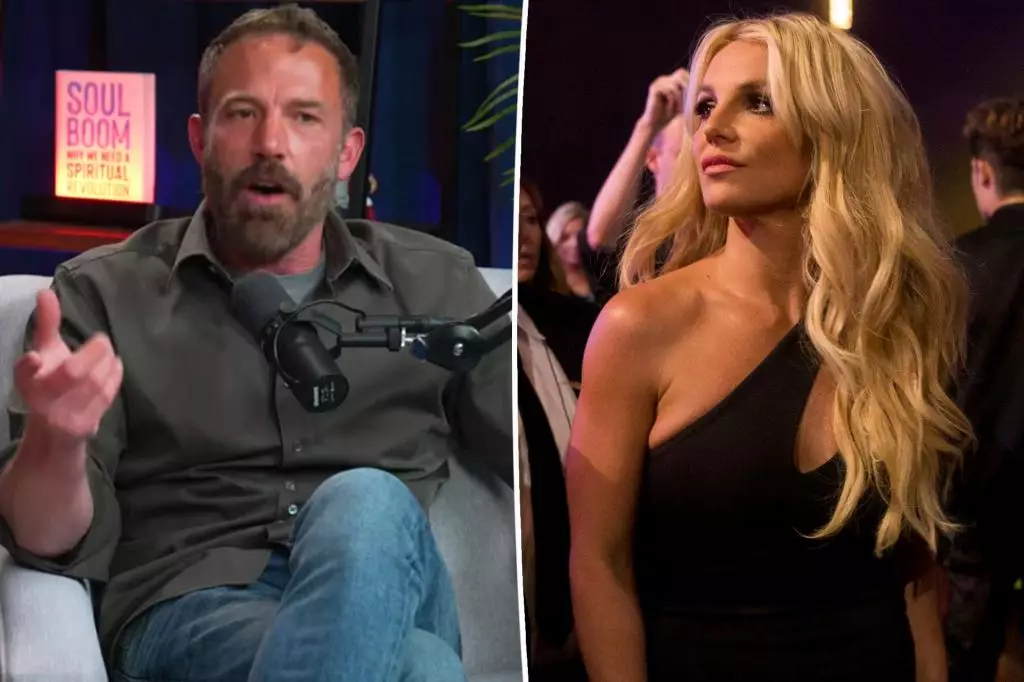In today’s age of social media frenzy and relentless paparazzi culture, the humane qualities of empathy often become overshadowed by sensationalism. Ben Affleck’s recent comments on the impact of paparazzi on Britney Spears serve as a potent reminder of this. Affleck, a Hollywood A-lister himself, expressed feelings of compassion for Spears during a tumultuous period in her life, revealing insights into the harsh realities faced by public figures. His candid admission hints at a deeper issue: the collective cruelty embedded in society’s fascination with celebrity misfortunes.
Affleck remembers first witnessing the ramifications of fame on Spears while observing the continuous harassment she faced from photographers. This reflection goes beyond mere observation; it opens a dialogue about the moral obligations of society: Are we complicit in the suffering of others when we engage in gossip and voyeurism? Affleck’s words suggest a sense of awareness that many seem to overlook: that the incessant pursuit of celebrity narratives can have dire consequences for those involved.
A Reflection on Cruelty and Compassion
Affleck’s description of the paparazzi as “people haranguing” celebrities captures the toxic atmosphere of external judgment and unsolicited intrusion. This behavior often escalates into what he characterizes as “collective cruelty.” The image portrayed to the public is often one-sided and doesn’t reveal the context behind the scenes. What viewers see are just the final snapshots, with no awareness of the turmoil that leads to those seemingly petulant expressions.
In Hollywood, where every emotion and action is magnified, the psychological toll on celebrities can be immense. Affleck’s attempts to emphasize empathy are commendable. It implies that even in a system designed to capitalize on personal downfall, there is room for understanding and compassion. Highlighting that it is often the “growling animal” that gets the spotlight, with the true sources of distress overlooked, urges a reconsideration of our shared societal responsibilities.
Examining the Timeline of Distress
Though Affleck didn’t specify the period he was referring to, it’s likely that his reflections were pointed toward the infamous 2007 incident where Spears faced a breakdown. The combination of intense public scrutiny and personal strife created a perfect storm for a tragic public narrative. Spears’ subsequent conservatorship, established in 2008, became emblematic of the larger conversation surrounding mental health and autonomy, and further exemplified the systemic issues surrounding celebrity culture.
Spears’ story is not just a cautionary tale; it serves as a grim reminder of the price of fame. Her struggles were visibly entwined with her star status, raising poignant questions about how society interacts with those who are in the limelight. This dichotomy between fame and personal wellbeing suggests a failure within the social framework to protect vulnerable individuals.
The Personal Connection and Public Perception
What adds an intriguing layer to Affleck’s remarks is the context of Spears’ playful Instagram post about a past encounter with him. Her mention of an alleged makeout session from years ago opens the floor for speculation about personal narratives in public life. It underscores how tangled personal relationships can become when viewed through the celebrity lens. Affleck’s avoidance of the topic during a paparazzi encounter emphasizes the difficulties of navigating public curiosity versus private realities.
This scenario illustrates an undeniable clash: the human element versus the constructed personas we see in media. How can individuals maintain their authenticity when so much of their lives are put under a microscope? Affleck’s reflections encourage a shift in conversation—a movement towards understanding rather than sensationalism.
In an industry driven by image, the complexities faced by individuals like Britney Spears deserve more than just casual commentary; they warrant an empathetic response and a cultural shift towards compassion over cruelty. The stories we consume can shape societal views and behaviors, and it’s critically important that we start valuing empathy as a moral imperative.

